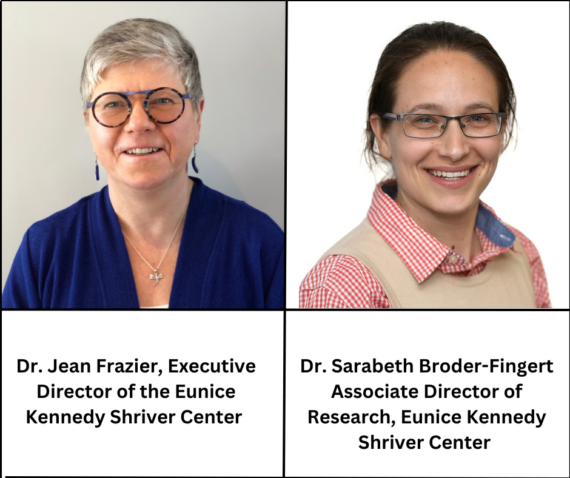Shriver Center's ECHO Autism Projects Address Major Gaps in Care
 Throughout its 50 plus year history, the Shriver Center has been at the forefront of improving the lives of individuals with disabilities, their families, and caregivers through education, research, and service. Two innovative projects advance that tradition, and the leaders for each project recently spoke about the impact and long-term goals of their work addressing gaps in autism care.
Throughout its 50 plus year history, the Shriver Center has been at the forefront of improving the lives of individuals with disabilities, their families, and caregivers through education, research, and service. Two innovative projects advance that tradition, and the leaders for each project recently spoke about the impact and long-term goals of their work addressing gaps in autism care.
“Both projects are a result of direct community needs. My project is a six-month autism diagnosis training using the Extension for Community Healthcare Outcomes (ECHO Autism) online learning platform,” said Dr. Sarabeth Broder-Fingert, Associate Director of Research for the Shriver Center.
Using this platform, Dr. Broder-Fingert trains pediatricians, residents, and health professionals in identifying the signs and hallmarks of autism spectrum disorder (ASD) through evidence-based case discussions and didactics. “The majority of our trainees are primary care providers (PCPs). However, a variety of other disciplines are also represented, including family medicine, medicine-pediatrics, speech-language pathology, and social work,” Dr. Broder-Fingert continued.
Dr. Broder-Fingert’s project is supported by the Autism Cares Network, which is funded by Autism Speaks. Over 65 people applied for the training and a cohort of 12 was accepted for the project, launched in January 2023. She elaborated that this is the first time all trainees will receive instruction in autism diagnosis, specifically using the Childhood Autism Rating Scale (CARS) and Rapid Interactive Screening Test for Autism in Toddlers (RITA-T). After gaining familiarity with the tests, the goal is to successfully integrate this new knowledge into their professional practices.
“ECHO is an ideal platform for this training. It allows for ongoing supervision, support, and feedback throughout the process as well, which is essential in assessing long-term effectiveness,” Dr. Broder-Fingert commented.
Dr. Broder-Fingert is hopeful that the increased familiarity with autism diagnosis from this training will soon provide tangible benefits to individuals with ASD, their caregivers, and support teams. “Autism diagnosis is a major crisis in Massachusetts right now. Families are waiting more than a year for appointments, and there is a shortage of providers trained in making the diagnosis, particularly in under-represented or minority communities. If an accurate diagnosis of ASD can be quickly made, an individual or family can begin the process of accessing needed services, which may have vast positive impacts on their quality of life,” she concluded.
Dr. Jean Frazier, Executive Director of the Eunice Kennedy Shriver Center, is also using the ECHO Autism online platform for her project entitled “ECHO Autism: Crisis Care” on training mobile crisis intervention teams (MCIs) across Massachusetts.
Dr. Frazier and her team established the MCPAP ASD-ID telehealth program in July 2020 to help support MCI teams and emergency service providersin their work with children and young adults during the midst of a behavioral health crisis. ECHO Autism: Crisis Care is an educational platform that was recently launched to augment the work of MCPAP ASD-ID.
“There are 26 MCI teams throughout the state. Our goal is to train those teams about the best evidence-based practices so that they can more readily assist children and young adults with ASD or intellectual or developmental disabilities (I/DD) during a behavioral health crisis,” Dr. Frazier elaborated.
Members of the MCI teams are primarily social workers or licensed mental health clinicians who visit homes and/or schools to conduct assessments on individuals experiencing a behavioral health crisis, with the goal of avoiding hospitalization.
Dr. Frazier’s ECHO project is funded by MassHealth and is currently in the pilot testing phase. There are two sessions per month for six months for a total of 12 educational sessions. Approximately five to ten people attend each session. Dr. Frazier expects that the total number will expand to approximately 120 throughout the remaining 18-month course of this project.
“In the short-term, our goal is to increase the knowledge and comfort of the MCI teams in working with individuals with ASD and I/DD. Long-term, one of our aims is to reduce the number of children and adults with autism and/or I/DD who are boarding in emergency rooms, and to reduce the number of these individuals who require inpatient hospitalization by increasing the number of community mental health clinicians who have expertise in working with these populations.” Dr. Frazier said.
Lastly, Dr. Frazier explained how the Shriver Center is uniquely positioned to take on educational projects like these two ECHO programs.
“Between the care we provide to patients, the evidence from literature, our daily observations, and the stories we hear from parents and families, it’s clear that training programs like these are vitally needed. We’re excited to fulfill our mission, through these two efforts, making a meaningful difference in the lives of people with autism and intellectual and developmental disabilities,” she concluded.
